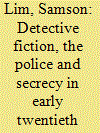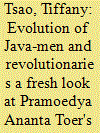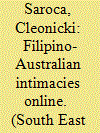|
|
|
Sort Order |
|
|
|
Items / Page
|
|
|
|
|
|
|
| Srl | Item |
| 1 |
ID:
111519


|
|
|
|
|
| Publication |
2012.
|
| Summary/Abstract |
Teenlit, a genre of popular literature for adolescents, was introduced to Indonesia around the beginning of the last decade and almost immediately attracted a large readership consisting predominantly of female adolescents. Its rapid rise has invited both favourable and hostile reactions from observers. Sympathetic literary critics view young people's attraction to it as a positive process towards the development of a healthy reading and writing habit. Meanwhile, hostile critics consider it as nothing more than light fiction containing questionable moral values, written in an unacceptable style. This article examines a representative example of such criticisms as a platform for discussing the relationship between the relatively new genre of adolescent literature and the wider context of language change. It seeks to show that hostility towards teenlit reflects a concern for the maintenance of standard Indonesian as the language of literature amid a rapidly changing language situation in which a major colloquial variety of Indonesian has been gaining prominence and encroaching on domains prescriptively associated with the standard variety, such as written literature. The negative reaction is also an assertion of an idealized view of literature, which holds that the function of adolescent fiction is to educate readers on the aesthetic function of language and sound moral values. The author demonstrates that this concern arises against the backdrop of a socio-political climate in which the state, having long exerted control over language use and language development, gradually ceases to be perceived as the sole authority on language. As such, it is an articulation of a desire to safeguard the existence of a linguistic authority.
|
|
|
|
|
|
|
|
|
|
|
|
|
|
|
|
| 2 |
ID:
111518


|
|
|
|
|
| Publication |
2012.
|
| Summary/Abstract |
Vietnam today is less in a process of transition from 'plan' to 'market' than in a process of state consolidation with clear parallels in the colonial period. The authors focus on four aspects of Vietnamese political economy under the colonial and post-colonial regimes: the interpenetration of state and enterprise through state-created monopolies; the interaction of regional and ethnic dynamics with the monopolies; the 'illegal' activities (smuggling, 'fence-breaking', etc) that accompanied the monopolies; and the way monopolies have served as bases for rampant diversification into speculative ventures. The parallels across the eras call into question conventional notions of rupture, and confirm the importance of structural constraints that continue to shape Vietnam's political economy.
|
|
|
|
|
|
|
|
|
|
|
|
|
|
|
|
| 3 |
ID:
111521


|
|
|
|
|
| Publication |
2012.
|
| Summary/Abstract |
The detective figure, literary and real, emerged in Siam between the late nineteenth and early twentieth centuries to bring clarity to increasingly complex social and political situations. In early detective fiction including the Seup saphakan [Investigating it All] (1892-97) and Nithan Thorng-in [The Tales of Thorng-in] (1904-05) series this was certainly the case - mysteries were solved, secrets revealed. In real life, however, the state's deployment of an army of detectives did not so much clarify as codify mysteries. This paper examines the links between the literary and the real detective, arguing that the appearance of detective fiction provided the vocabulary for understanding and dealing with social and political change in early twentieth century Siam.
|
|
|
|
|
|
|
|
|
|
|
|
|
|
|
|
| 4 |
ID:
111522


|
|
|
|
|
| Publication |
2012.
|
| Summary/Abstract |
This article undertakes an in-depth exploration of the trope of human evolutionary development undergirding Pramoedya Ananta Toer's Buru Quartet - a trope that has hitherto received no detailed critical attention in Pramoedya scholarship. Drawing on the traditional Javanese values of Pramoedya's childhood and the Marxist ideological values of his early adulthood, the Quartet casts the individual's moral development from selfish individualism to selfless community-mindedness as the development from animalism to 'modern humanity'. In the context of traditional Javanese and Marxist cosmologies, such self-denial ends in victory: respectively, the accumulation of personal power and the successful revolutionary replacement of capitalism with socialism. However, during his brutal imprisonment in the Darwinian wilderness of Buru, Pramoedya experienced an environment that rewarded animalism and made it difficult for those ascribing to 'human' values to survive. Originally composed in Buru, the Quartet bears the mark of its origins and its author's disillusionment, portraying the attainment of Javanese and Marxist standards of humanity as a decision to defy the laws of natural selection and overcome one's instinct for self-preservation. By dissociating the acquisition of humanity from the acquisition of power, the Quartet produces modified versions of the Javanese and Marxist moral human development based not on the expectation of success and the will to live, but on the expectation of failure and the determination to die.
|
|
|
|
|
|
|
|
|
|
|
|
|
|
|
|
| 5 |
ID:
111520


|
|
|
|
|
| Publication |
2012.
|
| Summary/Abstract |
Internet relationships, particularly those involving 'Asian' women and 'Western' men, are typically depicted as problematic. This article explores online intimacy between Filipino women and non-Filipino Australian men. It seeks to extend our awareness of the different ways intimacy is understood, measured and materialized online. In exploring how intimacy takes place online and is interpreted by people who may have different emotional repertoires and expectations about what constitutes intimacy, love and romance, the article engages with authenticity, gender performance and the development online of cathexis - trust, intimacy and love - across national and cultural boundaries and offline. In the process, it challenges popular myths about Filipino women, their non-Filipino partners and online relationships in general. The paper is based on ethnographic fieldwork which entailed interviews and participant observation in the Philippines and Australia and on the Internet with Filipino-Australian couples who met each other through some form of Internet technology. It also draws on the author's ethnographic research on Kasal, an online moderated forum that explores 'Fil-West' relationships. She highlights how participants use the Internet for relationship negotiation in ways that are meaningful to them.
|
|
|
|
|
|
|
|
|
|
|
|
|
|
|
|
|
|
|
|
|